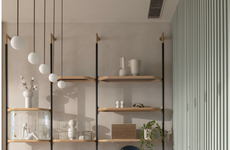
Hilarchitects Boasts a Beautifully Balanced Meditation Space in China
Kalin Ned — May 14, 2019 — Art & Design
References: hilarchitects & dezeen
Rapid urbanization calls for a spike in productivity, as well as an increase in stress levels, therefore, spaces like this serene meditation hall in rural China are quite necessary and popular. Built by Hilarchitects, the building takes up space in the Hebei province of Cangzhou.
To deliver a balanced and quaint experience, Hilarchitects were tasked with overhauling "six disused retail units that directly overlook sprawling wetlands." The interior of the serene meditation hall is characterized by quiet shaded corridors, tranquil "wood-lined rooms," as well as immersive water walkways. The activation is launched in order to help people relax and allow them to briefly "dissociate from their regular rhythm of daily life," while engaging in mindful meditation.
To deliver a balanced and quaint experience, Hilarchitects were tasked with overhauling "six disused retail units that directly overlook sprawling wetlands." The interior of the serene meditation hall is characterized by quiet shaded corridors, tranquil "wood-lined rooms," as well as immersive water walkways. The activation is launched in order to help people relax and allow them to briefly "dissociate from their regular rhythm of daily life," while engaging in mindful meditation.
Trend Themes
1. Urban Meditation - The need for relaxation in urban spaces creates an opportunity for architects to design meditation spaces in densely populated cities.
2. Wellness Tourism - The demand for peaceful destinations that cater to physical and mental well-being offers an opportunity for businesses in the travel and tourism industry.
3. Traditional Practices Revival - The revival of traditional practices such as meditation provides an opportunity for businesses to offer unique experiences while preserving cultural heritage.
Industry Implications
1. Architecture - Architects can capitalize on the need for serene spaces in urban areas by designing meditation halls or rooms in residential and commercial buildings.
2. Tourism - Hotels and resorts can cater to the growing demand for wellness tourism by incorporating meditation and mindfulness experiences into their offerings.
3. Mental Health - Businesses specializing in mental health and wellness can incorporate meditation as part of their treatment programs and services.
4.1
Score
Popularity
Activity
Freshness























